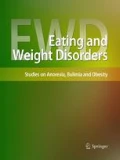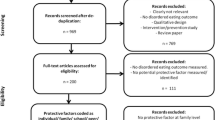Abstract
An Exploratory Study on the Intergenerational Transmission of Dieting Proneness within an Eating Disorder Population (IRB Protocol Number: 160928271).
Purpose
Parents and families are not the sole factor in eating disorder (ED) development and their involvement in recovery is crucial. However, parents provide a social and environmental context for a child’s eating and weight that cannot be completely discounted. The purpose of this study was to explore the intergenerational transmission of dieting behavior within an ED sample.
Methods
Participants (N = 65) were recruited for this cross-sectional study through four distinct ED treatment sites. Participants completed a questionnaire that was developed previously to examine parental feedback as predictor variables, as well as completing the Eating Pathology Severity Index (EPSI) as an outcome variable. A total of 60 completed the questionnaire items of interest to be included in the analyses. SAS JMP® 13.0 was used for descriptive analyses, correlations, and multivariable linear regressions.
Results
Results of the multivariable linear regression showed that the amount of variance explained by the final model for eating pathology severity (via the EPSI) doubled when parental feedback was included (Model 1: R2= 0.09, Model 2: R2= 0.20). Additionally, there was a significant relationship between the “Negative Direct Parental Feedback Subscale” and EPSI total scores (ß = 14.1; SD = 7.0; p = 0.05).
Conclusion
These findings of increased eating pathology associated with direct parental feedback in a clinical population of ED participants even when controlling for parental ED history suggests greater attention is needed within the ED literature on social and environmental factors and their potential associations with eating pathology.
Level of evidence
Level V, descriptive study.

Similar content being viewed by others
References
Jacobi C, Hayward C, de Zwaan M, Kraemer HC, Agras WS (2004) Coming to terms with risk factors for eating disorders: application of risk terminology and suggestions for a general taxonomy. Psychol Bull 130(1):19–65. https://doi.org/10.1037/0033-2909.130.1.19
Zerwas S, Bulik CM (2016) Maternal eating disorders and parenting: towards genetically informed models. Conference presentation: international Conference on Eating Disorders
Le Grange D, Lock J, Loeb K, Nicholls D (2010) Academy for eating disorders position paper: the role of the family in eating disorders. Int J Eat Disord 43(1):1–5. https://doi.org/10.1002/eat.20751
Harlan S (2009) Parents do not cause eating disorders: Families are important allies during treatment. https://www.feasted.org/parents-do-not-cause-eating-disorders-ps/
Claydon EA, Zullig KJ, Lilly CL, Zerwas SC, Davidov DM, Cottrell L, White MA (2018) An exploratory study on the intergenerational transmission of obesity and dieting proneness. Eat Weight Disord. https://doi.org/10.1007/s40519-018-0478-1
Bandura A (1989) Social cognitive theory. In: Vasta R (ed) Annals of child development, vol 6. Six theories of child development. JAI Press, Greenwich, pp 1–60
Stice E (1998) Modeling of eating pathology and social reinforcement of the thin ideal predict the onset of bulimic symptoms. Behav Res Ther 36:931–944. https://doi.org/10.1016/S0005-7967(98)00074-6
Bulik CM (2005) Exploring the gene-environment nexus in eating disorders. J Psychiatry Neurosci 30(5):335–339
Frederickson BL, Roberts T-A (1997) Objectification theory: toward understanding women’s lived experiences and mental health risks. Psychol Women Q 21:173–206
Quiles Marcos Y, Quiles Sebastian MJ, Pamies Aubalat L, Botella Ausina J, Treasure J (2013) Peer and family influence in eating disorders: a meta-analysis. Eur Psychiatry 28:199–206. https://doi.org/10.1016/j.eurpsy.2012.03.005
Lorasch-Gunderson D (2012) Relative influence of family, peers, and media on the development of eating disorders in adolescents. Retrieved from Sophia, the St. Catherine University repository. https://sophia.stkate.edu/msw_papers/66
Forbush KT, Wildes JE, Pollack LO, Dunbar D, Luo J, Patterson K, Watson D (2013) Development and validation of the eating pathology symptoms inventory (EPSI). Psychol Assess 25(3):859–878
Claydon EA, Davidov DM, Zullig KJ, Lilly CL, Zerwas SC, Cottrell L (2018) Waking up every day in a body that is not yours: a qualitative research inquiry on the intersection between eating disorders and pregnancy. BMC Pregnancy Childbirth 18(463):1–13
Costanzo PR, Woody EZ (1985) Domain-specific parenting styles and their impact on the child’s development of particular deviance: the example of obesity proneness. J Soc Clin Psychol 3:425–445. https://doi.org/10.1521/jscp.1985.3.4.425
Bland JM, Altman DG (1997) Cronbach’s alpha. BMJ 314(7080):572. https://doi.org/10.1136/bmj.314.7080.572
Golden NH, Schneider M, Wood C (2016) Preventing obesity and eating disorders in adolescents. Pediatrics 138(3):e20161649. https://doi.org/10.1542/peds.2016-1649
Treasure J, Todd G (2016) Interpersonal maintaining factors in eating disorder: skill sharing interventions for carers. In: Latzer Y, Stein D (eds) Bio-Psycho-Social Contributions to Understanding Eating Disorders. Springer, Cham
Treasure J, Sepulveda AR, Whitaker W, Todd G, Lopez C, Whitney J (2007) Collaborative care between professionals and non-professionals in the management of eating disorders: a description of workshops focused on interpersonal maintaining factors. Eur Eat Disord Rev 15(1):24–34. https://doi.org/10.1002/erv.758
Schaumberg K, Welch E, Breithaupt L, Hübel C, Baker JH, Munn-Chernoff MA, Bulik CM (2017) The science behind the academy for eating disorders’ nine truths about eating disorders. Eur Eat Disord Rev 25(6):432–450. https://doi.org/10.1002/erv.2553
Coffman DL, Balantekin KN, Savage JS (2016) Using propensity score methods to assess causal effects of mothers’ dieting behavior on daughters’ early dieting behavior. Child Obes 12(5):334–340. https://doi.org/10.1089/chi.2015.0249
Nickelson J, Bryant CA, McDermott RJ, Buhi ER, DeBate RD (2012) A modified obesity proneness model predicts adolescent weight concerns and inability to self-regulate eating. J Sch Health 82(12):560–571
Rodgers RF, Karine F, Henri C (2009) Gender differences in parental influences on adolescent body dissatisfaction and disordered eating. Sex Roles 61:837–849. https://doi.org/10.1007/s11199-009-9690-9
Rodgers RF, Paxton SJ, Chabrol H (2009) Effects of parental comments on body dissatisfaction and eating disturbance in young adults: a sociocultural model. Body Image 6(3):171–177. https://doi.org/10.1016/j.bodyim.2009.04.004
Sharpe H, Damazer K, Treasure J, Schmidt U (2013) What are adolescents’ experiences of body dissatisfaction and dieting, and what do they recommend for prevention? A qualitative study. Eat Weight Disord 18:133–141. https://doi.org/10.1007/s40519-014-0116-5
Wansink B, Latimer LA, Pope L (2017) “Don’t eat so much:” how parent comments relate to female weight satisfaction. Eat Weight Disord 22(3):475–481. https://doi.org/10.1007/s40519-016-0292-6
Acknowledgements
This research was supported, in part, by Grant #6R49CE002109-05-06 from the National Center for Injury Prevention and Control, CDC, to the West Virginia University Injury Control Research Center. Contents are solely the responsibility of the authors and do not represent official views of the CDC.
Funding
This research was supported, in part, by Grant #1R49CE002109 from the National Center for Injury Prevention and Control, CDC, to the West Virginia University Injury Control Research Center. Contents are solely the responsibility of the authors and do not represent official views of the CDC.
Author information
Authors and Affiliations
Corresponding author
Ethics declarations
Conflict of interest
S.C. Zerwas has consulted with Coleman Research. No other authors have a conflict of interest to declare.
Statement of human and animal rights
All procedures performed in studies involving human participants were in accordance with the ethical standards of the institutional and/or national research committee and with the 1964 Helsinki declaration and its later amendments or comparable ethical standards. This article does not contain any studies with animals performed by any of the authors.
Informed consent
Informed consent was obtained from all individual participants included in the study.
Additional information
Publisher's Note
Springer Nature remains neutral with regard to jurisdictional claims in published maps and institutional affiliations.
Electronic supplementary material
Below is the link to the electronic supplementary material.
Rights and permissions
About this article
Cite this article
Claydon, E.A., Lilly, C.L., Zerwas, S.C. et al. An exploratory study on the intergenerational transmission of dieting proneness within an eating disorder population. Eat Weight Disord 25, 1171–1181 (2020). https://doi.org/10.1007/s40519-019-00745-1
Received:
Accepted:
Published:
Issue Date:
DOI: https://doi.org/10.1007/s40519-019-00745-1




